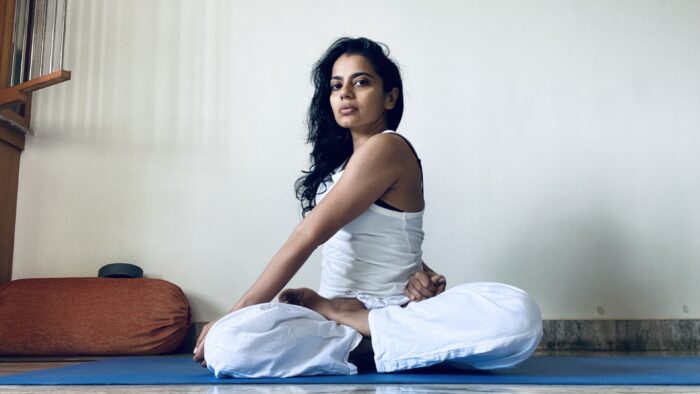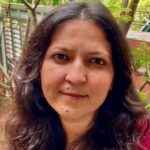Goa-based Hatha Yoga teacher, Alisha Netalkar, has always felt a “pull” towards yoga and after reading Paramahansa Yogananda’s Autobiography of a Yogi, she knew she wanted to explore and discover these practices to discover the true Self. I met Alisha when we were both working at ELLE, India, and while most of the office discussed fashion, we’d be talking about yoga. I left ELLE a few months before Alisha to attend a one-month course at the Sivananda ashram in the Himalayas and a year later, Alisha attended the same course at the Sivananda ashram in South India. We’ve kept in touch through the years and when I started working with Indica Yoga, I knew it was a blessed opportunity to collaborate with Alisha once again as her ideals and practices are perfectly aligned with Indica Yoga’s authentic, immersive, transformative approach to yoga. Introducing Alisha Netalkar…
Sophia: How did you make the shift from being a fashion stylist and journalist to teaching yoga?
Alisha: On the outside, there may have been an obvious shift, and that was the case in the fact that I took to teaching yoga full-time, but a pull towards understanding and knowing myself (both psychologically and spiritually) was something that drew me in since my early 20s. I clearly remember reading Autobiography of a Yogi by Paramahansa Yogananda in 2008 and feeling this pull towards understanding the fundamentals of existence, which came from a deeply familiar and an authentic space in me. The actual shift that followed in terms of living the practice took a long time to develop and settle, a process which was challenging, but also revelatory and transformative on many levels.
Sophia: Tell us about your teaching style and influences?
Alisha: I try to keep my approach simple and focus on developing awareness in any given practice. For me, the essence of yoga is tapped when we sharpen our ability to become aware of the changes taking place, not only on the level of the body, but also on the level of thought and emotion. I teach classical Hatha yoga, with an emphasis on grounding, holding and having an inner experience of the practice. This alone is a key guiding compass for all that I teach - be it asana, pranayama or meditative practices. For this reason, I am inspired by the intensity and precision of B.K.S Iyengar. However, since the philosophical understanding of yoga is key for having a lived experience of the practice, I am and have always been touched by the simplicity and directness of Advaita Vedanta. Teachings of sages like Ramana Maharshi, Nisargadatta Maharaj and Anandamayi Ma, who communicated the highest, most fundamental truth in the simplest of ways, help me find my way back to the Self every time I get caught up in intellectualising the practice to the point where the essence is lost. It is my responsibility to be mindful of this and communicate this essence through the space I offer when I step into the role of a teacher.
Sophia: You encourage meditative practices and teach them, too. Tell us about your meditation practice and the results you receive from it.
Alisha: Meditation was something that was encouraged by my father growing up, and though I didn’t practice the technique while I was younger, the seed was always present. It was only really given the chance to sprout and grow when I began seeking a ‘way out’ of my problems. The understanding that the way out is actually through is something that didn’t come by easy. It is still a process, and is slowly leading to an unlearning of dysfunctional habits and responses that come in the way of experiencing life fully. Through my practice I have noticed how decisions, which used to be challenging for me, are now made with greater ease, clarity and conviction. Meditation has led to a comparative sharpening of the intellect (the discriminating faculty of the mind) and an increase in the ability to hold and process emotion that was previously overwhelming and paralysing. The effect of pranayama, relaxation and mindfulness/meditation techniques on mental health is clear and strong, but it is important to note that all practices don’t give similar results, nor are they all suitable for every practitioner. This is where guidance comes in and is an extremely valuable facet of advanced yogic practice, particularly due to the effect it has on the nervous system and the mind.
Sophia: You just finished a course on Samkhya philosophy. What did you learn?
Alisha: I have actually finished a year of in-depth Samkhya and Yoga Sutra study. The clarity on concepts that are loosely thrown around in the name of what yoga is generically thought to be was thoroughly enlightening. I was intrigued by the simplistic framework of the system and the foundation it lays for an understanding of the Yoga Sutras in particular, which can take one years to truly grasp and absorb. However, being primarily drawn to non-dualistic philosophies, it was interesting to study a dualistic philosophy and I’m sure I will come to discover a common ground between the two as I progress to study Advaita Vedanta later in the year.
Sophia: Is there a full-time yoga community in Goa, or do you find the schools and studios are seasonal?
Alisha: The one thing I miss about living on a retreat, which I did for several years, is the ability to connect with like-minded people with a similar vision, spiritual values and the lifestyle it takes to follow that. Schools and studios in Goa are primarily seasonal and the approach to the practice, given that the place is a holiday destination doesn’t quite support an in-depth immersion. Having said that, there are a few yoga retreats and teachers who do live the practice, and communicate the teachings with their essence intact.
Sophia: What inspires you to practise and teach every day?
Alisha: I have, thankfully, come to a point where practice is a habit. This need not be limited to the asana practice, which if I do skip, I make sure to stick to my shorter daily sitting of a kriya, mantra chanting and/or meditation. What inspires me now is a combination of both scriptural understanding (thanks to my Guruji, Harsha, who is based in Rishikesh), and faith in the practice. Having a deeper understanding of myself and my temperament over the years, and working on solidifying my scriptural understanding has helped me grow stronger in faith and ground for the practice to grow roots. Though there is an inner knowing of the goal of yoga, I try not to be result-oriented with my day-to-day. And as far as teaching goes, it feels like purpose; where there are ups and downs, but it's the underlying feeling of purpose and meaning that drives me. Sharing these sacred teachings is a privilege and has the potential to change lives – this alone brings with it meaning and fulfilment. Also, through teaching, I have grown immensely as a practitioner. We all know that practice fuels teaching, but it also works the other way round.
Sophia: Tell us about the time you spent in Rishikesh and how the place and people affect you?
Alisha: Rishikesh has been close to my heart ever since my first trip nine years ago. It was a satsang with Mooji that first drew me there – along with being a confluence of everything I have ever wanted to understand and embody, the knowledge of the real Self. The energy of the place is palpable despite the growing crowds, the Ganga with her divine vibrations washing over the land, the many kindred souls that I encountered, and the impact that the turn of events have had on my spiritual journey is something I will always be thankful for.
Sophia: How does a daily, regular yoga practice affect your life choices (emotional, professional, familial, social)?
Alisha: A regular yoga practice is like an anchor, and I get to carry it with me – it’s not somewhere outside, nor is it dependent on external circumstances. It is this nature of having the practice sink in over time into every aspect of my being, both physical and non-physical, that solidified my faith and belief in this science and art of a practice. There is a marked shift from blaming external situations for my state of mind or happiness to an internal locus of control, where I assume responsibility for my decisions and experience of life, willingly. The ‘klesha’ of Avidya or ignorance becomes weaker as I keep observing the effect it has on my perception of the present moment and my interpretation of it as a result.
Sophia: Where does one eat a great Sattvic meal in Goa?
Alisha: If you’re looking for a menu that is specifically Sattvic, there’s Bean Me Up in Vagator. There’s also this place that I’ve been wanting to try and has caught my eye for a while – Cantine Indienne, in Palolem.
Sophia: What are you reading/studying right now?
Alisha: I’m currently studying the Hatha Yoga Pradipika and on the reading front, there’s Living Dharma by Jack Kornfield.
For more information about Alisha’s teaching schedules visit, https://alishanetalkar.com/





